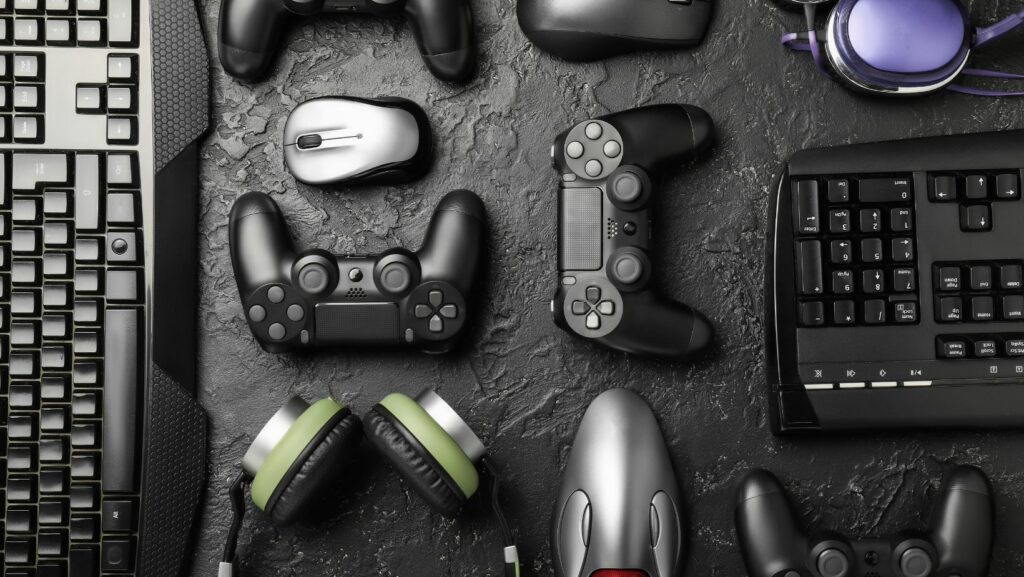As a lifelong gamer who’s spent countless hours on both PC and console platforms, I’ve witnessed the endless debate between these two gaming worlds. The PC vs console gaming rivalry has divided the gaming community for decades, with passionate advocates on both sides.
I’ve found that each platform offers unique advantages that cater to different gaming preferences and lifestyles. While PC gaming boasts superior graphics customization and modding capabilities, consoles deliver a streamlined, plug-and-play experience that many gamers find irresistible. Through my years of testing and playing on various platforms, I’ll break down the key differences that’ll help you decide which gaming experience might be right for you.
Key Takeaways
- PC gaming offers superior graphics customization and modding capabilities, while consoles provide a streamlined, plug-and-play experience requiring minimal maintenance
- Gaming PCs have higher upfront costs ($800-$3,000+) but benefit from deeper game discounts (50-90%), while consoles are more affordable initially ($399-499) with moderate game discounts (20-50%)
- PC platforms offer access to over 50,000 games and extensive backward compatibility, compared to consoles’ 3,000-4,000 games with limited backward compatibility options
- Gaming PCs support multiple input methods and free online play, while consoles require paid subscriptions for multiplayer features but excel at local multiplayer gaming
- Console gaming provides automatic updates and optimization, whereas PC gaming demands regular maintenance like driver updates, system cleaning, and hardware upgrades
PC Games vs Console Games
PC Gaming Evolution
The PC gaming landscape transformed from basic text adventures in 1975 to sophisticated 3D experiences by the 1990s. Early PC games like Zork operated through command-line interfaces while modern titles feature ray tracing technology advanced AI systems. Graphics cards evolved from basic VGA capabilities to dedicated GPUs delivering 4K resolution at 144+ frames per second.
| Decade | Key PC Gaming Advancement | Impact |
|---|---|---|
| 1970s | Text-based adventures | Established interactive storytelling |
| 1980s | EGA/VGA graphics | Enabled colored displays |
| 1990s | 3D acceleration | Created immersive environments |
| 2000s | Online multiplayer | Connected global gaming communities |
| 2010s | 4K gaming | Delivered ultra-high-definition experiences |
Console Gaming Milestones
The console market evolved from the Atari 2600’s 128 bytes of RAM to PlayStation 5’s custom SSD architecture. Early consoles featured fixed capabilities while modern systems receive regular software updates enhancing performance. Gaming companies introduced revolutionary features: Nintendo’s motion controls Sony’s 3D graphics Xbox’s online gaming network.
| Generation | Notable Console | Key Innovation |
|---|---|---|
| 2nd Gen | Atari 2600 | Removable game cartridges |
| 4th Gen | Super Nintendo | 16-bit graphics processing |
| 5th Gen | PlayStation | CD-ROM gaming format |
| 7th Gen | Xbox 360 | HD gaming standardization |
| 9th Gen | PS5/Xbox Series X | Ray tracing hardware |
Convergence of Technologies
Modern gaming platforms share more similarities than differences in 2023. Cross-platform play connects PC Xbox PlayStation Nintendo players in games like Fortnite Rocket League Minecraft. Cloud gaming services blur traditional platform boundaries enabling high-end gaming on basic hardware through services like GeForce Now Xbox Cloud Gaming Amazon Luna.
I’ve observed how development tools standardization leads to simultaneous releases across platforms. Game engines like Unreal Engine Unity create consistent experiences regardless of platform choice. The rise of digital distribution platforms Steam Epic Games Store PlayStation Store streamlines game access across devices.
Hardware and Performance Differences

Gaming hardware dictates the visual quality, loading speed, and overall gaming experience across platforms. Key technical specifications differentiate PC and console gaming setups, influencing gameplay performance and graphical fidelity.
Graphics Capabilities
PC graphics cards offer customizable settings and higher resolution options compared to consoles’ fixed specifications. Gaming PCs support resolutions up to 8K with compatible NVIDIA RTX 4090 or AMD RX 7900 XTX graphics cards, while current-gen consoles max out at 4K resolution. Here’s a comparison of maximum graphics capabilities:
| Feature | Gaming PC | PS5/Xbox Series X |
|---|---|---|
| Max Resolution | 8K | 4K |
| Frame Rate | Up to 360 FPS | Up to 120 FPS |
| Ray Tracing | Full Support | Limited Support |
| DLSS/FSR | Yes | Limited |
| Graphics Settings | Customizable | Fixed |
| Storage Feature | Gaming PC | PS5/Xbox Series X |
|---|---|---|
| Base Storage | User-defined | 825GB/1TB |
| Expansion Options | Multiple drives | Limited slots |
| Read Speed (Max) | 7,000 MB/s | 5,500 MB/s |
| Storage Type | User choice | Custom SSD |
| Hot-swappable | Yes | No |
Cost Comparison
The financial aspects of gaming platforms present distinct spending patterns across PC and console ecosystems. Based on my analysis of current market data, each platform offers unique cost considerations that impact the total gaming investment.
Initial Investment
PC gaming demands a higher upfront cost ranging from $800 to $3,000 for a gaming-capable system. A mid-range gaming PC includes:
- Graphics Card ($300-600)
- Processor ($200-400)
- Motherboard ($100-200)
- RAM ($50-150)
- Storage ($50-200)
- Power Supply ($50-150)
- Case ($50-150)
- Peripherals ($150-300)
| Platform | Entry Level | Mid Range | High End |
|---|---|---|---|
| Gaming PC | $800 | $1,500 | $3,000+ |
| PS5/Xbox | $399 | $499 | N/A |
| Nintendo Switch | $199 | $299 | $349 |
Game Pricing and Sales
Digital distribution platforms create distinct pricing dynamics for each gaming ecosystem:
PC Game Pricing:
- Steam sales offer 50-90% discounts quarterly
- Multiple digital marketplaces create price competition
- Free-to-play titles compose 48% of PC gaming revenue
- Bundle deals combine 5-12 games at reduced prices
- New releases maintain $59-70 price points longer
- Digital store sales offer 20-50% discounts
- Platform exclusivity limits price competition
- Subscription services provide game libraries for $10-15 monthly
| Store Type | Average AAA Game Price | Typical Sale Discount |
|---|---|---|
| Steam (PC) | $59.99 | 50-90% |
| PS Store | $69.99 | 20-50% |
| Xbox Store | $69.99 | 20-50% |
| Nintendo eShop | $59.99 | 30-40% |
Game Library and Exclusives
Game libraries represent a crucial differentiator between PC and console gaming platforms, with each offering unique catalogs and exclusive titles that shape the gaming experience.
Platform-Specific Titles
PC gaming provides access to over 50,000 titles through Steam alone, compared to 2,500-4,000 games on modern consoles. Console manufacturers leverage exclusive franchises to attract players:
- PlayStation features acclaimed series like God of War, Horizon Zero Dawn, The Last of Us
- Xbox offers exclusive titles including Halo, Forza Motorsport, Gears of War
- Nintendo maintains exclusive control over Mario, Zelda, Pokemon franchises
- PC exclusives focus on strategy games, MMORPGs, indie titles
- Steam supports games from the 1990s through modern releases
- GOG specializes in optimizing classic games for modern systems
- Console backward compatibility varies by manufacturer:
- Xbox Series X/S runs titles from Xbox One, 360, original Xbox
- PS5 plays PS4 games but lacks support for PS3, PS2, PS1
- Nintendo Switch offers limited retro games through subscription service
| Platform | Available Games | Backward Compatible Titles |
|---|---|---|
| PC (Steam) | 50,000+ | 30,000+ |
| PS5 | 3,800 | 4,000+ (PS4) |
| Xbox Series X/S | 3,000 | 4,000+ (All Xbox) |
| Nintendo Switch | 4,200 | 130+ (Nintendo Online) |
Gameplay Experience
The gameplay experience varies significantly between PC and console platforms, affecting how players interact with games and other players. Each platform offers distinct advantages in control schemes and multiplayer capabilities.
Controls and Input Methods
PC gaming emphasizes keyboard and mouse controls, providing precise aim in first-person shooters and extensive keybinding options in MMORPGs. Gaming mice offer adjustable DPI settings from 100 to 25,600, enabling players to fine-tune cursor sensitivity. PC platforms support multiple input devices, including:
- Gaming keyboards with N-key rollover
- Mice with programmable buttons (12-20 buttons)
- Xbox controllers through direct USB connection
- PlayStation controllers via third-party software
- Racing wheels with force feedback systems
Multiplayer Features
PC multiplayer gaming features free online play through platforms like Steam Epic Games Store. Cross-platform capabilities connect PC players with console users in games such as:
- Fortnite
- Call of Duty: Warzone
- Rocket League
- Apex Legends
- Minecraft
Console multiplayer requires subscription services:
| Platform | Service | Annual Cost |
|---|---|---|
| PlayStation | PS Plus | $59.99 |
| Xbox | Game Pass Ultimate | $119.99 |
| Nintendo | Switch Online | $19.99 |
PC platforms offer integrated voice chat Discord TeamSpeak while consoles rely on built-in party systems or manufacturer apps. Local multiplayer remains more accessible on consoles, supporting up to 4 players through split-screen gameplay on a single device.
Customization and Modding
PC gaming excels in customization through extensive modding communities that transform games beyond their original design. Steam Workshop hosts over 100,000 mods for popular games like Skyrim The Elder Scrolls V including texture enhancements graphical improvements character modifications gameplay tweaks.
Console games offer limited customization options primarily through official downloadable content (DLC) packages. PlayStation 5 Xbox Series X/S support basic modifications such as:
- Installing custom themes for the user interface
- Creating personalized button layouts
- Adjusting audio visual settings within predefined ranges
- Adding external storage devices for expanded capacity
The modding capabilities between platforms show significant differences:
| Feature | PC | Console |
|---|---|---|
| User-created mods | 100,000+ | Not supported |
| Texture modifications | Unlimited | Not available |
| Script extensions | Supported | Not available |
| Custom content creation tools | Available | Limited to specific games |
| Graphics configuration | Full control | Preset options |
PC gamers access specialized tools for creating modifying game content:
- Mod development kits (SDK) for creating new game elements
- Memory editors for adjusting game parameters
- Asset extraction tools for customizing textures models
- Script editors for changing game mechanics behavior
Game developers actively support PC modding through:
- Official modding tools releases
- Documentation for mod creators
- Steam Workshop integration
- Community forums for modding support
These customization capabilities create distinct gaming experiences where PC players modify games extensively while console users rely on manufacturer-approved updates enhancements.
Ease of Use and Maintenance
PC gaming requires regular system maintenance to ensure optimal performance. I routinely update graphics drivers patch operating systems upgrade hardware components when necessary. Basic PC maintenance includes:
- Install monthly Windows updates for security patches
- Update graphics drivers quarterly for performance optimization
- Clean dust from components every 6 months
- Monitor system temperatures using diagnostic software
- Defragment hard drives annually for faster load times
Console gaming focuses on plug-and-play functionality that eliminates most maintenance needs. The streamlined experience includes:
- Automatic system updates during idle time
- Pre-optimized games for the hardware
- No driver updates or compatibility checks required
- Built-in cooling systems that rarely need cleaning
- 5+ years of consistent performance without upgrades
Technical troubleshooting differs significantly between platforms:
| Issue Type | PC Resolution Time | Console Resolution Time |
|---|---|---|
| Game Crashes | 30-60 minutes | 5-10 minutes |
| Performance Problems | 1-2 hours | 15-20 minutes |
| Installation Issues | 45 minutes | 10 minutes |
| System Updates | 20-30 minutes | 10-15 minutes |
Storage management varies between platforms. PC gaming offers flexible storage options:
- Install games across multiple drives
- Choose installation locations
- Manage mod folders separately
- Compress game files to save space
- Use external drives without formatting
- Fixed internal storage capacity
- Standardized external drive support
- Automatic game file optimization
- Built-in storage management tools
- Quick transfer between internal external drives
Both PC and console gaming have their unique strengths and it’s clear that neither platform holds absolute superiority. I’ve found that the choice ultimately depends on personal preferences lifestyle and budget. PC gaming shines with its cutting-edge graphics customization options and extensive game library while consoles excel in user-friendly design and exclusive titles.
Today’s gaming landscape continues to blur the lines between platforms thanks to cross-play capabilities and cloud gaming services. Whether you’re a dedicated PC enthusiast or a console loyalist there’s never been a better time to be a gamer. The important thing is to choose the platform that best aligns with your gaming goals and priorities.





